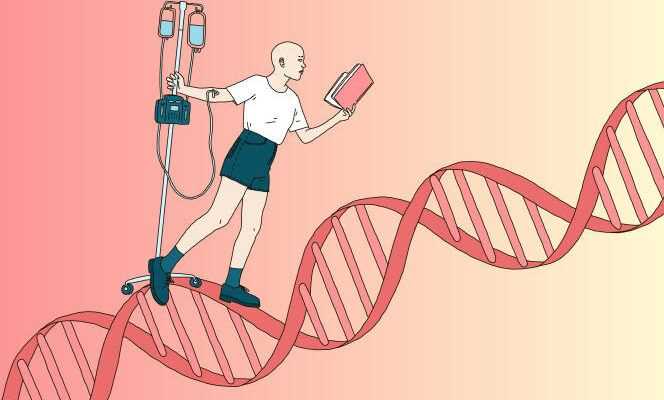She only had the German test to take to graduate. Marie (the first name was changed at her request), 18, was already planning her first year of medicine. Lately, she had lost weight a little, made some discomfort. She blamed it on the stress of studying. And then there was the event “Bordeaux celebrates the river”: “There were a lot of people, and at one point I said to my parents: I can’t look at the boats, otherwise I will fall.… “ This problem of balance led him to consult. Diagnosis: cancer of the cerebellum.
Telling the experience of young people with cancer, this is the object of the book Cancer in adolescents and young adults (Doin, 176 pages, 28 euros), released on June 3. Its author, the sociologist Thibaud Pombet, conducted a five-year survey of young people aged 15 to 25 with cancer. A cataclysmic disease, which disrupts all areas of their life in full construction. This situation leads to heavy questions, in contrast with the form of recklessness that tinges, most of the time, this period of existence.
Each year in France, around 1,700 adolescents and young adults develop cancer, “With a predominance of lymphomas or sarcomas”, specifies Doctor Stéphanie Proust, pediatric oncologist and coordinator of the Adolescents and young adults team of the Nantes and Angers hospitals – structures which have developed all over France for ten years. If the number of cases is stable, it masks a grim reality: compared to other age groups (children or older adults), the survival rate of these young people has improved little. The reasons given are linked to this “in-between” age: types of tumors, unsuitable care pathways, inadequate standards, less inclusion of this population in clinical trials, greater difficulty in following care, delay in diagnosis. … “These patients seem to live in a medical no man’s land, between pediatric medicine and adult medicine”, indicates the regional cancer network in Ile-de-France, in a December 2019 report.
A thwarted schooling
Cancer in particular forces these young people to ask themselves the question of the desire to have a child at an early stage. The cumbersome treatment can damage fertility, they are offered to keep their oocytes or spermatozoa, with a view to future parenthood. “The question is asked as soon as the diagnosis is announced”, confirms Stéphanie Proust. For Marie, it’s a second blow of the club. “We don’t think of a child at 18… And for me, who had never been to see a gynecologist before, it was a bit steep. ” Flavio Alves Aleixo, then in his fourth year of engineering school, was 22 when diagnosed with testicular cancer. “Infertility is scary. It reinforced my desire to have children. “
You have 63.71% of this article to read. The rest is for subscribers only.
